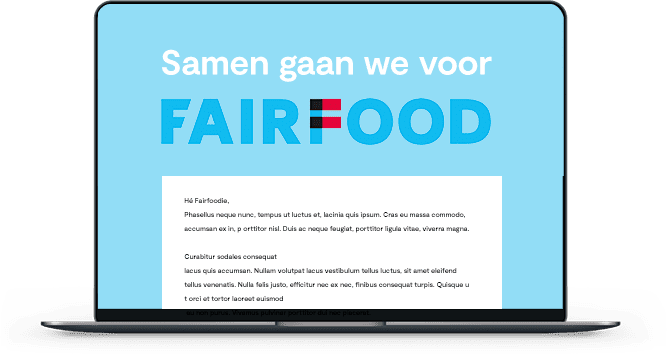The future of food with Genevieve Leveille
On the 5th of November, Fairfood hosted two panel discussions during the The Only Way is Up! Conference. Impressed with our panellists and the ways they envision the future of food, we conducted some interviews as well – for everyone who couldn’t make it to the conference. Today: the future of food with Genevieve Leveille, founder and CEO of Agriledger.
Genevieve is the Principal Founder of AgriLedger, a FinTech venture that works on a blockchain pilot project with fruit farmers in Haiti, sponsored by the World Bank. With AgriLedger, Genevieve aims to empower agricultural producers by democratizing their access to financial services and improving the transparency of the supply chain. She explains to Fairfood how she envisions her mission.
With a 25 year career in the banking business, how did you come to make the cross-over to FinTech with focus on the potential of blockchain technology?
“I’ve been working in supply chains for money for many years, helping bankers and treasures find better ways of keeping track of the cash. When I uncovered the blockchain technology, I realised that it provides us with a lot of opportunities to start to trimline the supply chain. The blockchain is about removing intermediaries and unnecessary stash in the supply chain of money.
Having grown up in Haiti, I’ve seen the plight of the smallholder farmers, and how they struggle to make sufficient money out of their crops. Bringing those two together, I saw a new technology that people would be able to understand and that could address inequalities by creating trust in supply chains.”
If you can remove those unnecessary intermediaries, you can start redistributing the knowledge and value in a more balanced way.
Where are the most severe trust issues in supply chains?
“Everywhere! There’s generally a lack of trust from the farmer towards the person that is buying from him or her. Farmers can’t trust that they will actually get a fair share and will get paid on time. There is also a lack of trust from that buyer that the farmer will deliver the promised quality in time. And at his turn, there is also a lack of trust from the buyer towards the next person in the chain that is buying from them, if they will receive the right price. So that lack of trust is all across the way.”
What consequences do you see coming from that lack of trust?
“There are several people in the supply chain transactions that aren’t strictly necessary. But why are they there? To provide a certain trust factor. They do the checking and the double-checking. So if you can remove those unnecessary intermediaries, you can start redistributing the knowledge and value in a more balanced way.”
Which solution do you aim to provide with Agriledger?
“We aim to make it more democratic. And that’s why blockchain works, because it democratises data. It doesn’t mean that data is totally open. We must protect the identity and certain information about the farmer. Information can be anonymised. The system should be attainable and not expensive. Traceability shouldn’t be co-opted by supermarkets and brands. Because that would mean that only the products they buy and sell will have the insurance of traceability. That marginalises the farmer. If a farmer produces 10 units and sells only 6 to the supermarket, then the other 4 are not traceable and remain invisible.”
I don’t see the farmer paying. It should be the revenue from the product that pays.
How can we solve the problem?
“I want to work with smallholder organisations to bring their constituency that way, instead of the brands bringing in the people. A coffee brand could use it, for instance, to be able to track what they are getting from the farmer. But all the data is coming from the farmer. That farmer has additional data that he or she can share with someone else. So the farmer is not indebted to a brand to provide them with a system. They are indebted to him for providing the data. Moreover, farmers need more access to finance. Having a digital track record of their transactions, creates trust about the expected production quantity and quality, so pre-investments can be secured better.”
Could we say that the first mile will benefit most from trust improval?
“The reality is that food companies are tracking the origin of the food, but they are not tracking it with enough level of certainty. Think about the salmonella contamination of organic eggs in Germany in 2018. They had to destroy hundreds of thousands of eggs, while maybe only 1% was affected. Transparency and traceability need to become the new norm.
If consumers buy a certain food that has more value because its origin is proven, the producer is retaining that value because something else cannot come to pretend it is from that same region. This comes in for products like wine and fish, but also lamb from New-Zealand. Transparency proves you that the product is worth the value that you expected and what you pay for.”
What will be the business case?
“We’re still trying to figure out how to charge for it. I don’t see the farmer paying. It should be the revenue from the product that pays. The customer gets information about the provenance and life cycle of the product, and that a fairer amount is provided to the farmers. That adds value for the brand. Then it’s not about giving a handout to the farmers. I’m totally against that. Farmers should get a fair share out of the production process. That doesn’t mean they should get 90%, because there is all that transformation and transportation of the product throughout the chain. But if you start with transparency, consumers will start to understand what the actual costs of a product are.”
Previously, we spoke with Heifer’s country director for Uganda, panellist William Matovu. Read the interview here.
